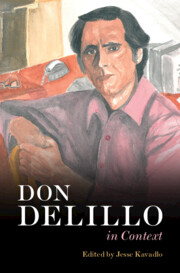Book contents
- Don DeLillo In Context
- Don DeLillo In Context
- Copyright page
- Contents
- Contributors
- Acknowledgments
- Abbreviations
- Introduction: Context, Content, Conflict
- Part I Places
- Part II History and Politics
- Part III Media and Pop Culture
- Part IV Literary Contexts
- Part V Material Contexts
- Part VI Social and Cultural Constructions
- Chapter 24 Religion and Spirituality
- Chapter 25 Race
- Chapter 26 Ethnicity
- Chapter 27 Gender
- Chapter 28 Time
- Part VII Writing and Writers
- Further Reading
- Index
- References
Chapter 25 - Race
White Male Mobility
from Part VI - Social and Cultural Constructions
Published online by Cambridge University Press: 19 May 2022
- Don DeLillo In Context
- Don DeLillo In Context
- Copyright page
- Contents
- Contributors
- Acknowledgments
- Abbreviations
- Introduction: Context, Content, Conflict
- Part I Places
- Part II History and Politics
- Part III Media and Pop Culture
- Part IV Literary Contexts
- Part V Material Contexts
- Part VI Social and Cultural Constructions
- Chapter 24 Religion and Spirituality
- Chapter 25 Race
- Chapter 26 Ethnicity
- Chapter 27 Gender
- Chapter 28 Time
- Part VII Writing and Writers
- Further Reading
- Index
- References
Summary
As an anatomist of socially inculcated identities, DeLillo deploys a recurring motif of automobility, which helps to dramatize and often satirize some common white American male inclinations. Propelled by a sense of something missing in their routinely plotted lives, DeLillo’s protagonists often lurch into escape mode in an archetypal white American male way, by jumping in a car and hitting the road. However, their clichéd and encapsulating choice of vehicular transport itself signals how difficult it can be to escape an identity largely formed by negation, that is, by white masculinity’s self-defining exploitation of others. Given the conceptual emptiness that DeLillo finds at the heart of white American male identity, pursuits of a seemingly more genuine self usually result in such protagonists driving themselves right back to where they more or less began.
Keywords
- Type
- Chapter
- Information
- Don DeLillo In Context , pp. 243 - 251Publisher: Cambridge University PressPrint publication year: 2022



